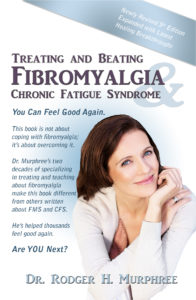Fibromyalgia and Restless Leg Syndrome
 Restless leg syndrome is a disorder in which there is an urge or need to move the legs to stop unpleasant sensations.
Restless leg syndrome is a disorder in which there is an urge or need to move the legs to stop unpleasant sensations.
Restless legs syndrome may affect up to 10% of the U.S. population. It affects both sexes but is more common in women and may begin at any age, even in young children. Most people who are affected severely are middle-aged or older.
RLS is often unrecognized or misdiagnosed. In many people it is not diagnosed until 10 to 20 years after symptoms begin. Once correctly diagnosed, RLS can often be treated successfully- however please know treating the symptom, restless leg syndrome is not the answer. Finding the cause and correcting the cause(s) is the answer. No one has a drug deficiency! Please read on.
RLS leads to sensations in the lower legs between the knee and ankle. The feeling makes you uncomfortable unless you move your legs. These sensations:
- Usually occur at night when you lie down, or sometimes during the day when you sit for long periods of time
- May be described as creeping, crawling, aching, pulling, searing, tingling, bubbling, or crawling
- May last for 1 hour or longer
- Sometimes also occur in the upper leg, feet, or arms
You will feel an irresistible urge to walk or move your legs, which almost always relieves the discomfort.
Most patients have rhythmic leg movements during sleep hours, called periodic limb movement disorder (PLMD).
 All of these symptoms often disturb sleep and therefore make trigger more RLS. Symptoms can make it difficult to sit during air or car travel, or through classes or meetings.
All of these symptoms often disturb sleep and therefore make trigger more RLS. Symptoms can make it difficult to sit during air or car travel, or through classes or meetings.
What Causes RLS?
In most cases, doctors do not know the cause of restless leg syndrome; however, they suspect that genes play a role. About half of people with RLS also have a family member with the condition.
However we do know that stress makes it worse and in my expert opinion is the root of the condition-stress and of course poor sleep, which leads to more stress, and more poor sleep-a vicious cycle!
Other factors associated with the development or worsening of restless legs syndrome include:
Chronic diseases. Certain chronic diseases and medical conditions, including iron deficiency, Parkinson’s disease, kidney failure, diabetes, and peripheral neuropathy often include symptoms of RLS. Treating these conditions often gives some relief from restless legs symptoms.
Medications. Some types of medications, including anti-nausea drugs, antipsychotic drugs, some antidepressants and cold and allergy medications containing antihistamines may worsen symptoms.
Certain Medications Can Cause RLS including:
Calcium channel blockers-Common calcium channel blockers include:
- Diltiazem
- Amlodipine
- Verapamil
- Nifedipine lithium,

Neuroleptics-
Common neuroleptics include:
- Abilify® (aripiprazole)
- Prolixin®/Modecate (fluphenazine)
- Thorazine® (chlorpromazine)
- Piportil (pipotiazine)
- Clozaril® (clozapine)
- Trilafon (perphenazine)
- Haldol® (haloperidol)
- Orap® (pimozide)
- Seroquel® (quetiapine)
- Stelazine® (trifluoperazine)
- Risperdal® (risperidone)
- Mellaril (thioridazine)
- Serentil® (mesoridazine)
- Navane® (thiothixine)
- Zyprexa® (olanzapine)
Please know that other drugs can cause RLS or make RLS worse including Lyrica, Neurontin, Requip, and Mirapex. Yes the very drugs promoted to help RLS can actually cause RLS.
Once again drugs aren’t the answer. Covering up symptoms with drugs is typically a disaster for fibromyalgia patients. A safer, more effective approach is to find the cause, low iron, poor sleep, low magnesium, low serotonin, etc. and correct the cause!
 Requip and Mirapex may cause the following side effects –
Requip and Mirapex may cause the following side effects –
- nausea
- stomach pain
- heartburn or gas
- diarrhea
- constipation
- weight loss
- dizziness
- drowsiness
- weakness
- headache
- sweating or flushing
- difficulty remembering or concentrating
- anxiety
- uncontrolled, sudden body movements
- shaking of a part of your body that you cannot control
- decreased sensitivity (response) to touch
- frequent or urgent need to urinate
- difficulty urinating or pain when urinating
- back, muscle, or joint pain
- pain, burning, numbness, or tingling in the hands or feet
- swelling of the hands, arms, feet, ankles, or lower legs
- dry mouth
Pregnancy. Some women experience RLS during pregnancy, especially in the last trimester. Symptoms usually go away within a month after delivery.
Anemia. Iron deficiency can cause RLS. If you have RLS have your blood checked for iron, folic acid and or vitamin B12 deficiency. I recommend checking your ferritin level checked. Ferritin levels shows person’s iron stores in the body. The test is sometimes ordered along with an iron test and a TIBC to detect the presence and evaluate the severity of an iron deficiency or overload. Optimal levels are above 50.
Other factors, including alcohol use and sleep deprivation, may trigger symptoms or make them worse. Improving sleep or eliminating alcohol use in these cases may relieve symptoms.
Stress And Poor Sleep are the Usual Cause of RLS (not the only cause but the most likely cause)
 Depleting your stress coping chemicals from poor sleep and or chronic stress, often leads to RLS. One of the main stress coping chemicals you need to help you deal with stress, is the mineral magnesium. The more stress you are under the more magnesium you use up.
Depleting your stress coping chemicals from poor sleep and or chronic stress, often leads to RLS. One of the main stress coping chemicals you need to help you deal with stress, is the mineral magnesium. The more stress you are under the more magnesium you use up.
Magnesium is a natural muscle relaxant. When you suffer with poor sleep and other stressors, you deplete your magnesium, which then leads to tight achy muscles or worse, muscle cramps, twitches or spasms.
Poor sleep doesn’t allow your body to repair itself. Normally when you sleep at night your body, including your muscles, have a chance to rest and repair themselves. If you don’t sleep well at night your muscles never have a chance to rest and this leads to RLS.
Poor sleep also causes you to deplete other stress coping chemicals including the “happy hormone” serotonin, which leads to more pain, low moods, and further compromises your sleep.
Of course it is a vicious cycle-Restless leg syndrome can result in a decreased quality of sleep (insomnia). Lack of sleep can lead to daytime sleepiness, anxiety or depression, fibro fog, and poor-sleep.
Of course poor sleep also leads to more pain as those who struggle with their sleep increase their inflammatory chemicals by 40 percent.
 Patients who follow my protocols including restoring stress coping chemicals, and reestablishing deep restorative sleep, see their RLS go away within several days.
Patients who follow my protocols including restoring stress coping chemicals, and reestablishing deep restorative sleep, see their RLS go away within several days.
Finding the cause(s) and correcting the cause(s), most likely poor sleep, depleted stress coping chemicals, including magnesium are at the root of solving the RLS problem.
Obviously I’m a BIG believer in restoring deep restorative sleep. I’ve been doing this for 18 years and know without a doubt that if I can get my patient into deep restorative sleep on a consistent basis and can restore their stress coping chemicals to optimal levels, RLS usually disappears.
In my 5th edition book, Treating and Beating Fibromyalgia and Chronic Fatigue Syndrome, I devote an entire chapter to finding and fixing the causes of poor sleep. If you’ve not read my book I encourage to do so. The book is available Barnes and Noble, Amazon, and at www.getfibrobooks.com






I do so wish you took Blue Cross/Blue Shield Insurance and I lived closer to your location. I have your book though, so hopefully that will help (Fibro, chronic upper respiratory/asthma/allergies, tons of allergies, RLS, and of course, non sleeper, LOL). Thanks for your many informational articles. Smiles, Sue C
Please follow the protocols in the book and if needed know that you can always do a phone consult http://www.treatingandbeating.com
I have Fibro, chronic fatigue, RLS, use a CPAP, neuropathy in the legs(not diabetic), chronic migraines, anxiety, depression, panic attacks, bipolar, tachycardia, hypothyroid, dry eye syndrome, vertigo, fatty tissue pancreas. I have been through lab work, ear specialist, neurologist and I get medicated, but not one doctor can tell me why I have all these conditions
Sorry you are struggling. I know it can be a real challenge dealing with all these issues. I do phone consults and you can call clinic to learn more 205-879-2383 or learn more at http://www.fibroconsults.com